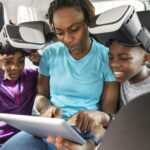Buying a new comprehensive plan
In today's rapidly evolving educational landscape, innovation and technology play crucial roles in shaping inclusive education practices. As Victoria Joel, founder of Circle of Hope Private Academy (COHA), continues to revolutionize special needs education in northern Namibia, her approach underscores the transformative power of innovative teaching methods and technologies.

Technology is just a tool. In terms of getting the kids working together and motivating them, the teacher is the most important.
— Bill Gates
The Role of Technology in Inclusive Education
Technology has emerged as a powerful tool for enhancing learning experiences and addressing diverse student needs. At COHA, integrating technology into classrooms isn't just about digital tools—it's about leveraging these tools to create inclusive environments where every child can thrive. From assistive technologies that aid communication for non-verbal students to adaptive learning platforms that personalize instruction, COHA utilizes a variety of technological innovations to cater to individual learning styles and abilities.
Breaking Barriers with Digital Accessibility
One of the key challenges in inclusive education is ensuring accessibility for all students, regardless of their disabilities. Digital accessibility initiatives at COHA focus on making educational materials and resources available in formats that accommodate various disabilities. For instance, screen readers and text-to-speech software assist visually impaired students, while captioning and transcription services support those with hearing impairments. These efforts not only facilitate learning but also empower students to participate fully in educational activities alongside their peers.
Personalized Learning through Adaptive Technologies
Adaptive learning technologies represent another cornerstone of COHA's commitment to inclusive education. These technologies adapt content and instructional strategies in real-time based on students' responses and progress. By analyzing data and learning patterns, adaptive technologies tailor learning experiences to meet individual needs, ensuring that each student receives personalized support and challenges appropriate to their level of ability.
Innovating Beyond the Classroom
COHA extends its innovative approach beyond traditional classroom settings. Virtual reality (VR) and augmented reality (AR) technologies are used to create immersive learning experiences that engage students and enhance their understanding of complex concepts. These technologies are particularly effective in stimulating sensory experiences and providing interactive simulations that cater to different learning modalities.
Collaboration and Professional Development
Effective implementation of educational innovations and technologies requires continuous professional development for educators. At COHA, ongoing training programs ensure that teachers are proficient in using new technologies and methodologies. Workshops, seminars, and collaborative learning sessions enable educators to exchange best practices and explore innovative approaches that promote inclusive education.
Looking Ahead: Future Directions in Educational Innovation
As COHA looks to the future, the emphasis remains on staying at the forefront of educational innovation. Exploring emerging technologies such as artificial intelligence (AI) and machine learning holds promise for further enhancing personalized learning experiences and advancing inclusive practices. By embracing these advancements responsibly and inclusively, COHA continues to pave the way for transformative education in Namibia and beyond.



